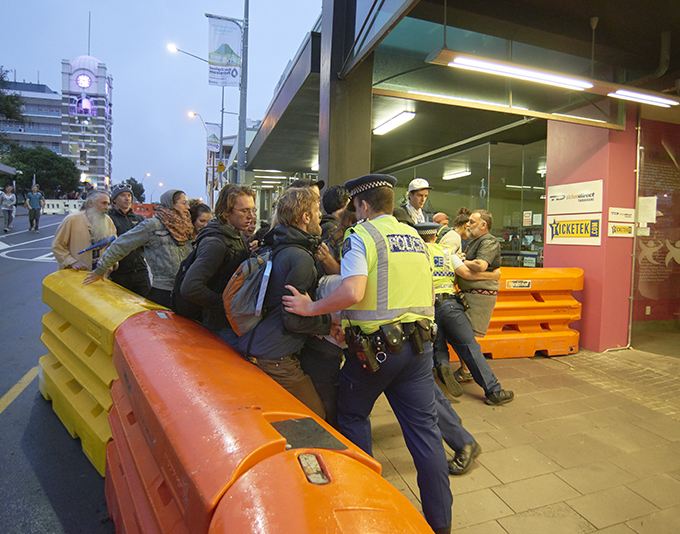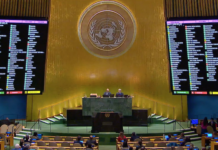
By Kendall Hutt
Young environmentalists were on the front lines of the fight against oil and gas exploration in New Zealand today with the People’s Climate Rally blockading an industry summit in New Plymouth.
Jesse Sheehan, a musician and Greenpeace supporter, and Poonam Maharaj, who has been fundraising with Greenpeace since late January, both took part in the blockade of TSB Showplace to peacefully disrupt the Petroleum Summit.
The People’s Climate Rally has been organised by a coalition of groups opposed to the expansion of the fossil fuel industry, including 350 Aotearoa, Break Free, and oil free groups from Wellington and Auckland.
Maharaj says she was “so excited” to be taking part in the rally, which was her first action.
“A day into the job I found out about the climate rally, and it’s something I would love to be a part of, actively making a change.”
Sheehan, who has kept his “toe in the water” volunteering with Greenpeace both here and in the United Kingdom since 2015, admits this wasn’t his first protest.
“I’ve stopped a coal train in the past.”
Similar motivations
Both Sheehan and Maharaj have similar motivations behind taking part in the rally.
“I hope that oil companies know that they can’t run and hide, and that they know there will be opposition to them being in New Zealand, because the government have sort of sold them this idea ‘come to New Zealand and you won’t have any resistance, you’re welcome and New Zealanders want you here.’
“So I hope they will realise that is not the case and they will reap resistance and it won’t be as easy as the government said it would be,” says Sheehan.
Maharaj, however, says she was protesting due to the harm seismic blasting and oil drilling had on marine life.
“My sort of main reason why I’m going is because of the impact it’s having on our marine life. It’s not very fair on the animals and they haven’t done anything wrong to deserve this.
“It’s not something I feel our government should be encouraging.”
Future in own hands
Amanda Larsson, a Greenpeace campaigner involved in organising the rally, speaking to Asia Pacific Report from Taranaki, says it is important to include youth voices in the fight against deep sea oil drilling.
“It’s their future that they’re fighting for, and again for them to have a future the oil industry can have no future, so it’s really important for young people to kind of take their future into their own hands.
“What we’re finding is that the government is not standing up for their future, so it’s really important for people like you and me and the young people of this country to take that responsibility into their own hands and ensure we put a stop to oil and gas drilling in this country.”
The People’s Climate Rally also recognises the work of local organisations in Taranaki, such as Climate Justice Taranaki, Ngatiawa ki Taranaki Trust, and Parihaka Papakāinga Trust, who have been opposing oil and gas activities including drilling, flaring and fracking for many years.
“This is their land, their territory, and their fight,” says Larsson.
“Now that that conference has moved to Taranaki with strong local opposition, it’s very important for us to support what people are already doing on the ground and to give them all the support they need to carry on here.”
Responsibility to Pacific
Larsson, Maharaj and Sheehan also agree New Zealand has a responsibility to its Pacific neighbours to amends its stance on oil and gas exploration in the country.
This is due to the fact Pacific countries bear the brunt of the effects of climate change.
“It’s often Asia-Pacific and the developing countries within the developing world that are hit the hardest by climate change, less so than Western countries,” says Sheehan.
Maharaj also feels New Zealand should be setting an example in terms of renewable energy solutions.
“We should be starting that now so our Pacific neighbours can start following suit and we can have an oil free country and world.”
Small island states such as Kiribati, Marshall Islands and Tuvalu have already been affected by rising sea levels, while fresh water and food supplies across the Pacific are affected by salt water intrusion.
Tropical cyclones have plagued the Pacific on an increasing basis since the 1970s as the effects of El Nino have drastically risen, the most recent effect being Cyclone Winston, devastating Fiji in early 2016.
“I think as a Pacific nation New Zealand has a responsibility to the people who are most going to be affected by climate change which is our Pacific neighbours.
‘Stand together’
“It’s really important for the New Zealand public to stand together with the people of the Pacific in opposing the oil and gas industry which is the main driver of climate change,” Larsson says.
New Zealand has been criticised on the world stage for its commitment to scaling back fossil fuels.
This is because New Zealand’s fossil fuel production subsidies have increased seven-fold since former Prime Minister John Key’s election in 2008.
The government has received four “Fossil of the Day” awards at climate change talks since 2012, the most recent being at the COP21 conference in Paris in 2016.
Since National came to power in 2008, over half a million square kilometres of land and sea have been proposed for release for international oil companies to search and drill for oil.
Multiple opposition welcome
Although the rally is considered a continuation and escalation of previous protest in Auckland and Wellington at the yearly summit, it is a “family friendly event” where people concerned about climate change can show their opposition in multiple ways, says Larsson.
“Some people will kind of choose to put their bodies on the line and engage in non-violent direct action. Other people might choose to just hold some banners, attend some workshops and display solidarity by just being there in support and this rally is sort of being about open to everyone to show their opposition in their own way.”
Sheehan will also be taking part in the protest as a musician “to keep spirits high” and “use my voice that way as well”.
Eight hundred people have registered to attend the rally, but organisers expect at least 200 people will take place in the protest activity across today and tomorrow.
Thursday’s focus is on solutions, with talks and workshops delivered by a host of researchers and industry professionals on sustainable energy, including former Green Party co-leader Jeanette Fitzsimons and Ecotricity director Al Yates.











































